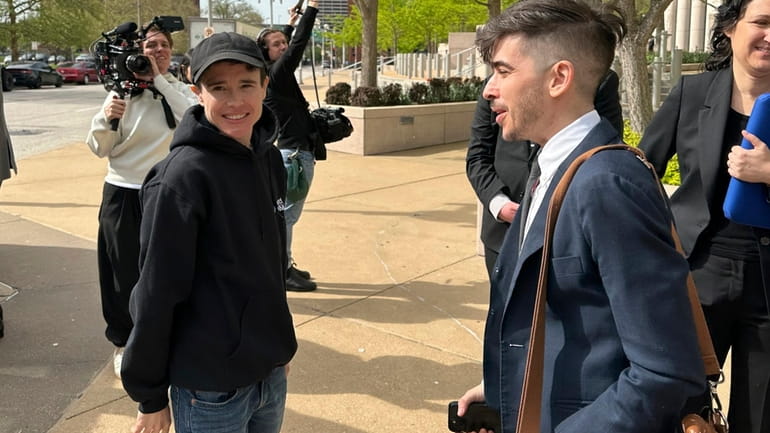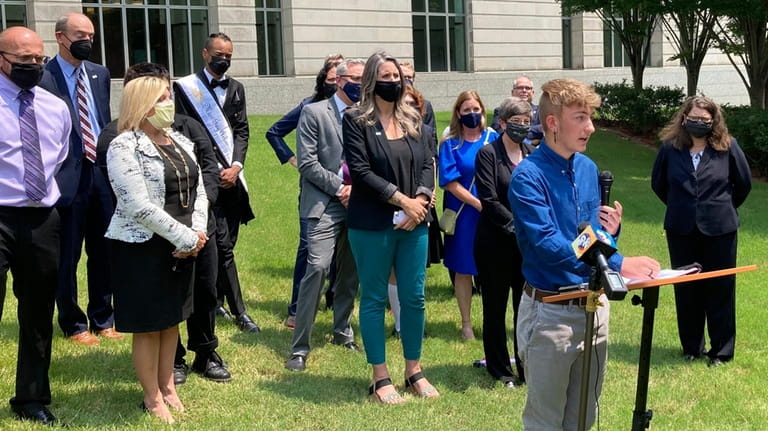Federal appeals court hears arguments on nation's first ban on gender-affirming care for minors

ACLU attorney Chase Strangio, right, and actor Elliot Page leave the 8th U.S. Circuit Court of Appeals after a hearing Thursday, April 11, 2024, in St. Louis. The Federal appeals court is hearing arguments over Arkansas' first-in-the-nation ban on gender-affirming care for minors. Page was at the hearing in support of the ACLU’s challenge to the law. Credit: AP/Jim Salter
ST. LOUIS — Arguments before a federal appeals court that is considering whether to reinstate Arkansas' first-in-the-nation ban on gender-affirming care for minors focused Thursday on whether it and similar restrictions adopted by two dozen states discriminate on the basis of sex.
Ten judges with the 8th U.S. Circuit Court of Appeals in St. Louis heard arguments over a judge's ruling last year that struck down the ban as unconstitutional. The 2021 law would prohibit doctors from providing gender-affirming hormone treatment, puberty blockers or surgery to anyone under 18.
An attorney for the American Civil Liberties Union, which challenged the law on behalf of four transgender youths and their parents, said the restriction infringes on the longstanding rights of parents to make decisions about their children's medical care.
“Arkansas believed that that government knew better than the loving parents in this case what was best for their minor children,” Chase Strangio, deputy director for transgender justice for the ACLU’s LGBTQ and HIV Project, told the court. “That burdens that longstanding right of parents to direct the medical care of their children.”
At least 24 states have adopted laws restricting or banning gender-affirming medical care for transgender minors, and most of those face lawsuits. The restrictions on health care are part of a larger backlash against transgender rights, touching on everything from bathroom access to participation in sports.
The 43-minute hearing on the Arkansas law drew a packed audience that included the actor Elliot Page, who has filed a brief asking the court to uphold last year's ruling.
Dylan Jacobs, the deputy solicitor general for Arkansas, argued that the law doesn't discriminate based on sex because it bans the treatments for a specific purpose.

Dylan Brandt speaks at a news conference outside the federal courthouse in Little Rock, Ark., July 21, 2021. Credit: AP/Andrew DeMillo
“Minors may be prescribed testosterone for any purpose other than gender transition under this statute,” Jacobs said, adding that states have “wide-ranging authority” to regulate health, safety and medical ethics.
The case went before the full court rather than a three-judge panel after it granted a request by Republican Attorney General Tim Griffin. The move could speed up the case's march toward the U.S. Supreme Court, which has been asked to block similar laws in Kentucky and Tennessee. All but one of the judges hearing arguments Thursday were appointed by Republican presidents.
Jacobs was repeatedly questioned by Judge Jane Kelly, who was appointed to the court by former President Barack Obama, about the state's arguments that the law doesn't discriminate based on sex.
Judge David Stras, who was appointed to the court by former President Donald Trump, asked attorneys on both sides whether gender identity is "fully fixed" before the end of puberty and whether that would be justification for a ban like Arkansas'.
Jacobs said the Legislature setting 18 as the cutoff age implies that was part of its reasoning. Strangio noted that none of the treatments banned by Arkansas are prescribed before the onset of puberty.
It’s unclear when the 8th Circuit will make a ruling. Chief Judge Steven Colloton said it will issue a decision “in due course.”
“This ongoing battle, in Arkansas and across the United States, is a stark reminder of the challenges we face in ensuring that everyone has the freedom to access the care they need and deserve,” the families challenging the law said in a statement after the hearing.
U.S. District Judge Jay Moody last year ruled that Arkansas' health care restrictions violated the due process and equal protection rights of transgender youths and families. He also ruled that it violated the First Amendment by prohibiting doctors from referring patients elsewhere for such care. Moody had temporarily blocked the law before it could take effect in 2021.
The ACLU is also representing two medical providers of the care. Multiple medical groups, including the American Medical Association and the American Academy of Pediatrics, have opposed Arkansas' ban and urged the 8th Circuit to uphold the decision against it. An attorney for Justice Department, which opposes Arkansas' ban, also appeared before the court.
The state has pointed to appeals court rulings allowing Alabama, Kentucky and Tennessee's bans to be enforced. Arkansas’ attorneys have called the care “experimental,” a description that Moody’s ruling said was refuted by decades of clinical experience and scientific research. The state has argued that Moody's order creates a “novel new” right that parents can direct their children to receive medical care that the state does not find safe.
Judges’ orders are temporarily blocking enforcement of similar bans in Idaho and Montana.
Arkansas' ban was enacted after the majority-GOP Legislature overrode a veto by Asa Hutchinson, the Republican governor at the time. Current Gov. Sarah Huckabee Sanders, Hutchinson's successor and also a Republican, has said she would have approved the ban and last year signed legislation making it easier to sue providers of such care for malpractice.
___
This story has been updated to correct that the court’s chief judge is Steven Colloton, not Lavenski Smith.
